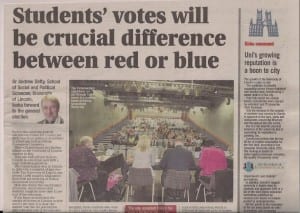This article first appeared in The Lincolnshire Echo, Thursday April 30 edition.
 Earlier this week the general election candidates for Lincoln put their case to an audience of students at a hustings held at Bishop Grosseteste University. They will participate in a further debate on the University of Lincoln campus in May.
Earlier this week the general election candidates for Lincoln put their case to an audience of students at a hustings held at Bishop Grosseteste University. They will participate in a further debate on the University of Lincoln campus in May.
They are well advised to do so. Lincoln is a marginal seat with a large student population. The Conservatives won in Lincoln in 2010 with a majority of just over 1,000.The University of Lincoln has around 13,000 students while more than 2,000 are studying at Bishop Grosseteste University. Most live within the constituency of Lincoln, which means that students comprise more than 15 per cent of the electorate.
If one bears in mind that the margin of victory in Lincoln in 2010 was 2.3 per cent, it is clear that the student vote has the potential to play a decisive role in the outcome of May’s election in the constituency.
There are, however, a number of factors which may work against the student vote having a significant impact in Lincoln, such as the fact that the 18 to 24 age group is generally less likely to vote than other age-groups, and changes to the method of electoral registration may mean that even fewer students are registered to vote than the 2010 election.
Those Lincoln students who do vote could also choose not to vote in the city; while those studying in Lincoln have a clear interest in the outcome of the election here, some students who have moved to Lincoln to study will prefer to vote in the constituency where they grew up.
Given that Lincoln is an important marginal, those students who want to cast a tactical vote could choose to cast it where it will count the most.
The timing might also have an effect on the turnout in student towns and cities across the UK, as early May is when most students will be in the middle of an examination period. It’s also important to remember that students do not vote as a group; there is in fact no such thing as the “student vote”.
The political affiliation of students varies as it does among the rest of the population. University of Lincoln students have been actively campaigning on behalf of all the main political parties and a number of our graduates are standing for election, including for the Conservatives in Morley and Outwood and in Cleethorpes, and for the Liberal Democrats in Sleaford and North Hykeham.
I have been polling first-year politics students at Lincoln since before the last general election and majority support has switched between Labour and the Conservatives throughout the Parliament.
The only consistent feature has been a decline in support for the Liberal Democrats in the wake of the announcement of increased tuition fees, something which is reflected in national polls of student voting intentions. National polls also indicate that university graduates are less likely to vote UKIP than those who have not been to university, which may be a problem for the party in Lincoln and other cities with a large student population.
It is to be hoped that students in Lincoln vote, and do so in large numbers. The student body has become and active and integral part of the city of Lincoln and they have the potential to be an influential part of the electorate as well.
The reality is that the student vote in Lincoln is unlikely to be decisive in May but it could be, and if students want their voices to be heard, both locally and nationally, they should take this opportunity to get out and vote.

Pingback: General Election 2017: constituency profiles - Lincolnshire | Who Runs Britain?